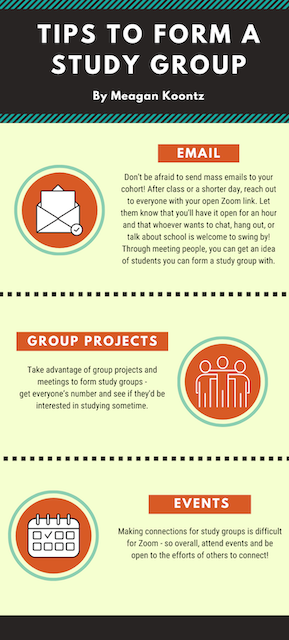SWLAW Blog | Dean's Fellow Digest

July 14, 2020
Dean's Fellow Digest Issue #11 - The Importance of Study Groups Within Online Learning and More!
Issue: 2020-11
Dean's Fellows consistently strive to support students in realizing their full academic potential, leading ultimately to success on the bar exam and in the workplace. To support all Southwestern students in this goal, the Dean's Fellows created this Digest as a way to check-in at critical times throughout the semester with helpful tips, strategies, and encouragement.
IN THIS ISSUE:
- The Importance of Study Groups Within Online Learning
- More on Study Groups + Tips on How to Form a Study Group
The Importance of Study Groups Within Online Learning
By: Emily Hart*
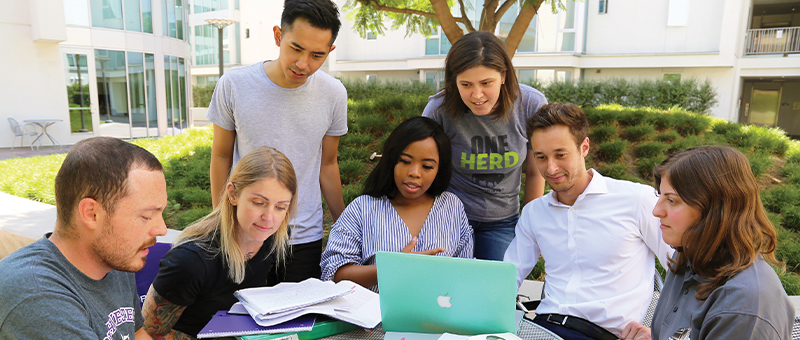
As you enter law school, you have probably heard someone mention the importance of joining a study group. While certainly the decision to join a study group is individual in nature (and I encourage you to study in the modality that works the best for you), personally, I believe I would not have excelled as much as I did during my first year if it were not for those I studied with. We are all on the same law school journey, so why not work together in the process?
One reason to participate in a study group is the community you create with those you work with. A big part of law school is about making connections—not just with faculty and alumni, but also your peers. You are all future lawyers, which is why it is important to connect with each other now. In the future, you will come to each other regarding advice on a case, or even a potential job opportunity.
On a smaller scale, another reason to participate is to obtain a new view of a legal issue you may not have fully understood before. For example, when reviewing adverse possession within your own property outline, you may believe you have a complete understanding of its elements. However, after discussing adverse possession out loud and applying it to a scenario proposed by one of your group members, you may realize that you do not fully understand one of its elements. You can then take this element and the proposed fact pattern to your professor for clarification.
As I have emphasized, study groups can be very beneficial in law school generally, and they are even more important now as online learning quickly becomes a necessity. It is easy to feel distanced from your law school experience when learning from a computer screen. You miss those short conversations with your peers before class and the subtle laughter during a lecture when a professor tells a joke. Nonetheless, Southwestern’s sense of community remains strong.
One suggestion is to reach out to your Dean’s Fellow to help you create a study group. Your Dean’s Fellow can create the conversation within their assigned group of students and connect you to others who are willing to participate.
Another tip is to take advantage of all the screen time you have with your classmates. For example, log into your Zoom lecture a few minutes prior to class. You will be surprised by how many students are present and eager for interaction.
Third, create a platform where your classmates can connect. For example, many Southwestern organizations use the app, Slack, to communicate. Create a channel for each of your classes and send a link to your class inviting them to participate.
Lastly, take advantage of school events. There are many upcoming opportunities to interact with our Southwestern community (watch out for the forthcoming “Today @ SW” emails, beginning in August), but there are also some school study halls currently being offered.
For example, Southwestern’s Student Bar Association (SBA) has begun hosting weekly study hall sessions for SCALE students.
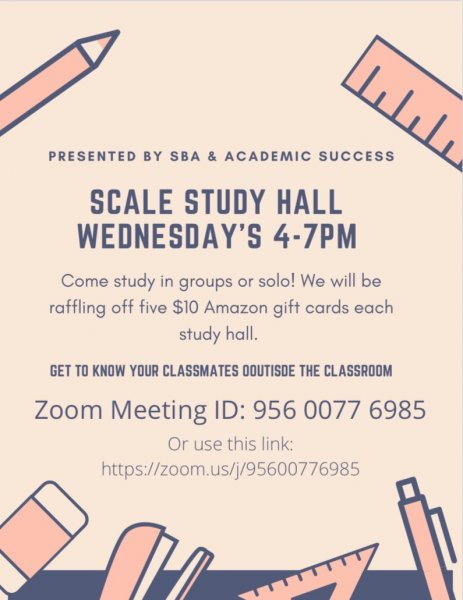
Log into the Zoom ID: 956 0077 6985 every Wednesday from 4:00 p.m. -7:00 p.m. to study with your peers and get to know your classmates outside of the classroom environment.
More on Study Groups
By: SCALE Dean's Fellow, Eric Naessig*
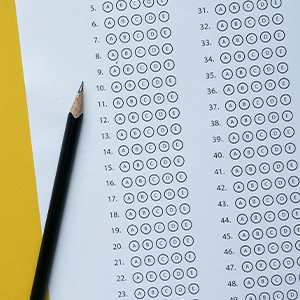 Though students may typically view multiple-choice practice as a solo study activity, there is indeed value in reviewing questions with other students. In a group setting, students can read over the questions together and each select the answer that they believe to be most likely. Then students can share their answers with each other and articulate the reasons for their selection. If the entire study group arrives at the same correct answer, then this reassures the students that they are on the same page of their fellow peers. If the selected answers differ, though, then this opens up opportunities to discuss and even debate the merits of the various choices.
Though students may typically view multiple-choice practice as a solo study activity, there is indeed value in reviewing questions with other students. In a group setting, students can read over the questions together and each select the answer that they believe to be most likely. Then students can share their answers with each other and articulate the reasons for their selection. If the entire study group arrives at the same correct answer, then this reassures the students that they are on the same page of their fellow peers. If the selected answers differ, though, then this opens up opportunities to discuss and even debate the merits of the various choices.
These discussions help to reinforce the concepts and explore the nuances that students should keep an eye out for when this material shows up in an exam setting. Students discussing their reasoning also helps to strengthen the process of thinking through test questions. These conversations grant insight into how students view the topics and what methods they use to eliminate other multiple-choice options. This sheds light on where some students might have gone wrong to ensure the same errors are not made again.
Talking through multiple-choice problems and discussing the basis for one’s reasoning ultimately represents a very active way to learn, especially when done in a back-and-forth exchange with other group members. Therefore, these study experiences are more likely to stick out in a student’s mind anytime the same concepts come up. This exercise also advances a collaborative learning process that pulls together the collective knowledge of the group in order to view a singular topic from different angles.
*About the Author:
EMILY HART
 Emily is a 3L traditional day student interested in family law and special education law. In addition to serving as this year's Supervising Dean's Fellow, Emily is the Co-President of the Women's Law Association, Teen Court, and is the Vice President of Bisong.
Emily is a 3L traditional day student interested in family law and special education law. In addition to serving as this year's Supervising Dean's Fellow, Emily is the Co-President of the Women's Law Association, Teen Court, and is the Vice President of Bisong.
Two of Emily's most memorable Southwestern experiences include being a Teaching Assistant for Professor VanLandingham's criminal law class and advocating for children with disabilities in the Children's Rights Clinic run by Professor Rodriguez-Fee and Professor Waterstone.
ERIC NAESSIG
 Eric is a SCALE II student who graduated from Emerson College with a BA in Writing for Film and Television. He concurrently earned his MFA in Screenwriting and MA in Film Studies at Chapman University. Eric previously worked as a freelance script reader and creative consultant in the film industry, and now his goal is a career in entertainment law.
Eric is a SCALE II student who graduated from Emerson College with a BA in Writing for Film and Television. He concurrently earned his MFA in Screenwriting and MA in Film Studies at Chapman University. Eric previously worked as a freelance script reader and creative consultant in the film industry, and now his goal is a career in entertainment law.
His extracurriculars include the Entertainment Law Society and the Intellectual Property and Arts Society. Eric will serve as a Teaching Assistant for LAWS and Evidence. Eric looks forward to helping students as they shape their own stories at Southwestern.
MEAGAN KOONTZ
Meagan 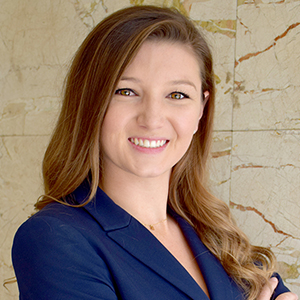 is a SCALE II student aiming to join the Los Angeles District Attorney’s Office after graduation. In addition to having the honor of being a Dean's Fellow, Meagan is a chairman for the Trial Advocacy Honors Program and a teaching assistant for various SCALE I courses.
is a SCALE II student aiming to join the Los Angeles District Attorney’s Office after graduation. In addition to having the honor of being a Dean's Fellow, Meagan is a chairman for the Trial Advocacy Honors Program and a teaching assistant for various SCALE I courses.
If her posted availability does not coincide with your schedule, please email her, and she would be happy to find a time that works for you or any student that would like assistance.
Southwestern Law School Dean's Fellows | Scheduling and Booking Website
Dean’s Fellows are upper-division students with strong academic skills who go through a rigorous application and training process. They are an integral part of the Academic Success and Bar Preparation Department. They are carefully selected based on their academic excellence and ability to teach other students best-practice study methods that will help them become acclimated to the study of law. Dean’s Fellows meet with students as academic mentors.
Please click HERE to make an appointment with a Dean's Fellow.
